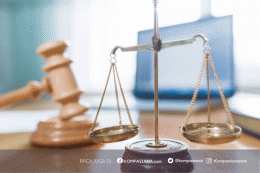B.Sources of Constitutional Law
a.Sources of Law in the Material Sense
The definition of legal sources in this material is always seen from the content or material regulated in the legislation, as for the content and material of the legislation to be made by the lawmaking body must be based on a single Constitution or Constitution of a country. Any legislation that is born and will be formed must not conflict with the basic norms of a country or conflict with higher laws. In Indonesia, the highest source of law is the 1945 Constitution of the Republic of Indonesia, thus every regulation that will be formed must not contradict the 1945 Constitution of the Republic of Indonesia and if it contradicts the material side, it can be canceled through judicial review.
b.Sources of Law in the Formal Sense
Formal sources of law are always associated with the process and Mechanism and authority in law making. This means whether The law was born and made by the institution for the formation of laws and regulations and has been in accordance with existing mechanisms and has contained the contents of the sources of Law recognized in Indonesia. There are seven formal sources of Constitutional Law in Indonesia, namely:
1.Constitution
According to Jimly Asshiddiqie, the constitution is the basic law, the basic norm, and at the same time the highest position in the state system. The constitution itself is divided into two, namely the constitution in the sense of written and unwritten constitution.
2.Legislation
Legislation according to Jimly Asshiddiqie, is a written regulation that contains legal norms that are binding for the public, established by legislators and regulators or implementing agencies that have delegated authority from the law to establish certain regulations.
3.Constitutional Customary Law
Customary constitutional law is the original law of the Indonesian people in the field of customary constitutional law. Examples: provisions regarding swapraja, indigenous state law alliances such as villages, gampong, and regarding religious courts.







